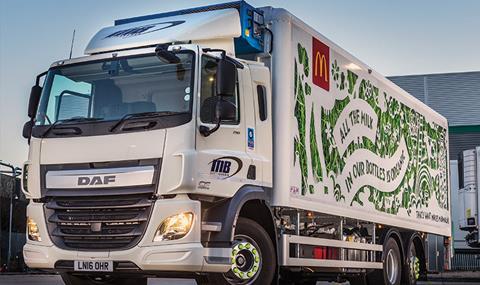
Martin Brower, which handles McDonalds' logistics in the UK, has a target of reducing its fossil fuel usage by 80% by 2020, and believes its use of biodiesel – based on waste product from the restaurants it delivers to – will help it hit that target.
Speaking to delegates at the LoCity Fuels in Action roadshow held at Kempton park in Surrey this week (20 March) Tony Winterbottom, GM - Operational Support, at Martin Brower said that when they set the 80% reduction target back in 2007 they initially believed it would come from elements such as route optimisation and reducing fuel consumption caused by bad driving.
Servicing 1,369 McDonalds locations in the UK and Ireland from four distribution centres, Martin Brower delivers some 70 million cases a year – and that is a volume of goods that has risen from 40 million cases a year back in 2007.
As a result its fleet now runs 27 million kms a year.
“We started a process in 2007 where we were bringing back waste from restaurants. We return 20,000 tonnes of cardboard, that was originally collected by waste contractors, but we do it on behalf of the restaurant. We also collect 3,500 tonnes of organic waste, 4,000 tonnes of grease trough waste and 4.2 million litres of used cooking oil.
“The used cooking oil we recycle. We turn it into biodiesel for our fleet and that is where the challenge started. We bring it back from all the restaurants and that 4.2m litre produces 3.8m litres of biodiesel,” Winterbottom added.
“Our projected biodiesel use is 7.7m litres in 2018 - 8 million would be our target for a 20% reduction in fossil fuel use.”
The ultimate measure of carbon reduction though is CO2 output per cage delivery. For the optimum result the best vehicle for carbon reduction is an artic which has a CO2 output per cage delivery of 0.65.
This is a result of the trailer capacity being 42 cages. A van can only carry 4 cages, so it takes 11 vans to do the work of one biodiesel powered artic. For one van the CO2 output per cage delivery comes in at 5.24.
“We hear it all the time about these big vehicles entering the city causing air pollution but maybe they are not quite as bad as you think,” he told delegates.
“We have actually set another target, now looking for a 51% reduction in CO2 emission reductions from our 2012 base by 2025. That is a stretching target but we will continue to reduce our reliance on fossil fuels.”
This approach will be encapsulated in a new livery on the fleet: ‘We recycle all our cooking oil to power this truck’.”














